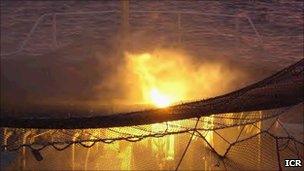Japan 'to continue' Antarctic whaling
- Published

Japan charges Sea Shepherd activists with launching incendiary devices onto the whaling ships
Japan intends to send its whaling fleet back to the Antarctic this year, a senior official has told BBC News.
There has been speculation that campaigns by activists, money problems and new rules at sea might persuade Tokyo to stop Antarctic whaling.
But at the International Whaling Commission (IWC) meeting, Japan's Joji Morishita said the plan was to return.
The Sea Shepherd Conservation Society, which forced the last hunt's early closure, says it will be back too.
Finding a way to deal with the organisation's vessels is the main obstacle Japan sees to continuing for the next season and beyond.
"We are now discussing how we can send our fleet back to the Antarctic Ocean," said Mr Morishita, Japan's deputy commissioner to the IWC and a senior official in the Fisheries Agency.
"Simply put, the attack from Sea Shepherd organisation is the one we have to consider how we prevent that to happen again."
During the IWC meeting, being held in Jersey, Japanese delegates showed pictures and videos that, they said, showed the campaigners attacking whaling vessels with projectiles including flares, which set netting alight, and glass bottles filled with foul-smelling butyric acid.
They also showed Sea Shepherd boats ramming the whalers, and said reinforced ropes had been put in the water to entangle propellers.
"The attack this past year became so severe that we didn't have any choice to try to prevent the worst from happening," said Mr Morishita.
Each successive year, Sea Shepherd has sent bigger fleets and faster vessels, while Japan has downscaled its forces; last season, for the first time, the activists had the upper hand.
Rather than catching 850-odd whales - the official target - the eventual haul was about 170.
It is not clear how Japan intends to protect its fleet in any future expedition - it was not just a matter of sending military patrols, Mr Morishita said, as that was a legal minefield.
Demonstrating force
A further obstacle Japan faces is that, from next year, new regulations on maritime pollution mean the Nisshin Maru, its factory ship, will not be permitted in Antarctic waters with tanks full of heavy fuel oil without a refit.
Another is financial. Japan's national budget was in trouble even before the impact of the recent earthquake and tsunami; and with sales of whalemeat falling, the cost of the hunt is rising.
But Mr Morishita suggested all of these issues would be easier to overcome than Sea Shepherd's opposition.
Some observers have suggested that Japan sees blaming Sea Shepherd as a way to escape from Southern Ocean whaling without losing face.
Mr Morishita said this was not the case, and the basic policy remained unchanged.
Sea Shepherd activists have staged demonstrations outside the IWC meeting here - the organisation is barred from attending - and it is clear that it will send its fleet to the Southern Ocean again if Japan does return.
"Sea Shepherd will also return and will once again intercept and block their operations," the organisation's head Paul Watson wrote on his blog earlier this week.
"If they return, we will launch Operation Divine Wind, and our vessels the Bob Barker, the Steve Irwin, and the Brigitte Bardot will soon return to the remote and stormy seas of the Southern Ocean Whale Sanctuary to do what we do best - defend the whales!"
- Published12 July 2011
- Published10 July 2011
- Published16 February 2011